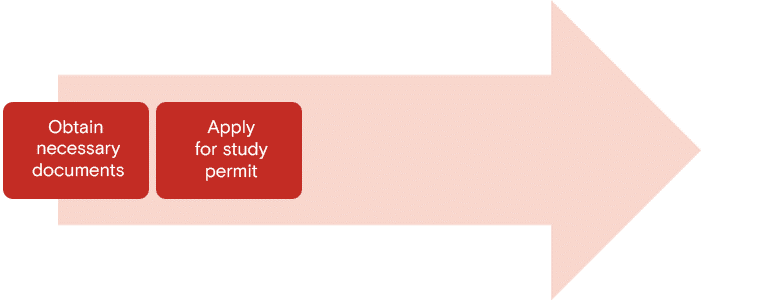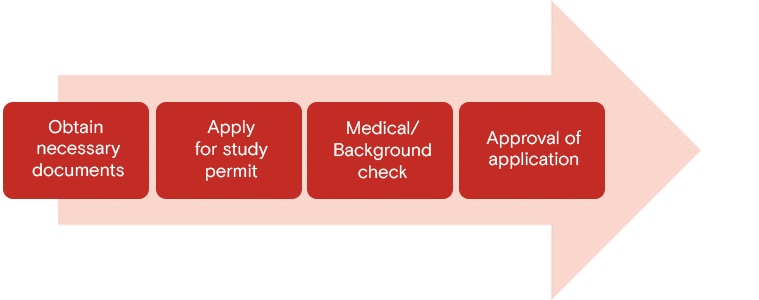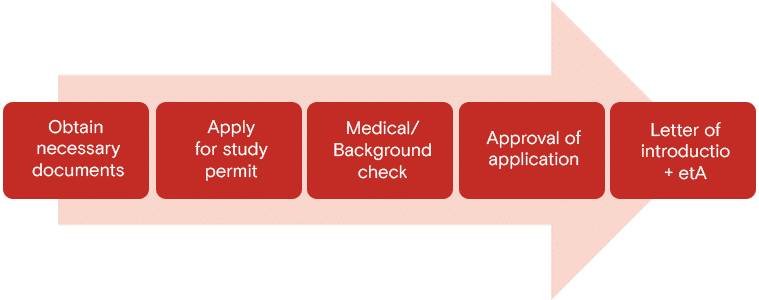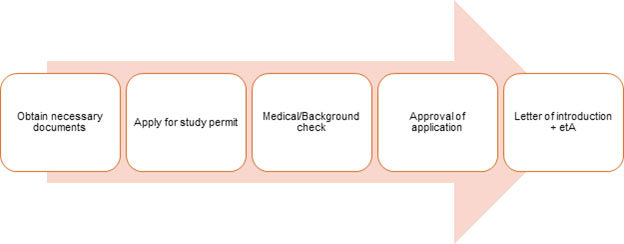Every year, thousands of bright young minds aspire to study in some of the best universities in the world. The immigration authorities of Canada offer licensed permits to assist foreign students in obtaining top-notch education from the country’s varied and esteemed educational institutions. Any student who wishes to enroll in an educational establishment in Canada may do so by applying for a study permit. Perhaps this is the reason why we at MJS immigration have witnessed an immense surge in the number of study permit applications in the recent past. Having been able to permit such students and providing them the opportunity to fulfill their aspirations makes us proud to have been part of their journey.
We endeavor to encourage more global scholars to apply to prestigious Canadian universities which offer a whole new world of opportunities.

What is a study permit?
To put it in simple, linguistic terms, a “study” permit is for “students”. As per definition, a study permit is a document that allows a foreign national to pursue their education at a designated learning institution in Canada. It is issued by Immigration, Refugees and Citizenship (IRCC) and is valid till the time the individual completes his/her education. It is important to remember the last point as it is at this time that the applicant must consider other immigration options if he desires permanent residency in Canada.
How to obtain a study permit?
The minimum requirements for obtaining a study permit are as follows:
- An acceptance letter from the designated learning institution (DLI)
- Sufficient funds to cover the tuition fees for a year, living expenses and return transportation fare.
- The candidates must assure that they will leave Canada at the end of their study permit
- No criminal records
The immigration authorities might request for additional documents depending on the state of affairs for each individual.
Financial support
Eligible students must provide proof of funds showing sufficient financial backup to obtain a study permit. This can be done through any of the following documents:
- Details of a Canadian bank account in the candidate’s name
- Guaranteed Investment Certificate issued from a Canadian financial institution
- Proof of student loans from a bank
- Receipt for the payment of tuition and housing fees
- Bank statement from the last four months
- A letter from the institution/person lending them money
- Proof of scholarship or funded education program
The minimum funds necessary (except for the province of Quebec) according to IRCC are outlined in the table below:
| INDIVIDUALS RELOCATING TO CANADA | AMOUNT OF FUNDS REQUIRED PER YEAR (ADDITIONAL TO THE TUITION) | AMOUNT OF FUNDS REQUIRED PER MONTH (ADDITIONAL TO THE TUITION) |
| Student | $10,000 | $833 |
| First family member | $4,000 | $333 |
| For each additional accompanying family member | $3,000 | $255 |




Application Process
The student must obtain the study permit before coming to Canada. For our overseas client we at MJS Immigration maintain an intimate network of emails and calls to expedite the procedure. Once they obtain all the necessary documents – passport, acceptance letter from a DLI and proof of financial support, they may submit an online application for issuing a study permit. The immigration authorities will also ask for the candidate’s biometrics before the application is processed. Meanwhile, the applicant might also have to appear for an interview with their own country’s officials and get medical exams and background checks.
The steps involved in the application of a study permit are summarized below:

Post application approval
Once the application is approved, the candidate will receive a letter of introduction along with an Electronic Travel Authorization (ETA) or temporary resident visa from the immigration officials. The candidate will have to present these documents upon arrival in Canada.
The issued study permit will be valid till the student completes his/her education with an additional 90 days. The additional 90 days gives the student enough time to prepare to leave Canada or apply for an extension of the permit.
Conditions that come with the study permit
- The study permit lets the holder work on or off campus without a work permit, provided they meet the necessary requirements.
- The student must reveal his/her passport, study permit and eTA if he/she returns to Canada after travelling abroad during the course of the study.
- Health insurance is not provided under study permit by the government.
- Once the student finishes their course, the study permit will expire within 90 days of that day, irrespective of the date stamp mentioned in the document
Renewal of study permit
Students can renew their study permit by an online application procedure to restore their status as a student. The student must apply for renewal of the permit at least 30 days before it expires. The processing time for study permit renewal is around 90 days, hence if the applicants are anticipating an extension they should apply for a renewal as early as possible. If an applicant wishes to stay back in Canada but is no longer studying, then they can opt for the following options:
- Apply for a work permit
- Apply to change status and stay as a visitor
Applicants must note that an expired study permit requires them to discontinue their studies until the document is renewed. For our ongoing study permit clients, we issue reminders of expiry and renewal well in advance to give them sufficient time to complete the necessary formalities.
Options after graduation
International students who have completed their secondary/ post-secondary programs in Canada can apply for a post graduate work permit (PGWP). This allows these individuals to live and work in the country once they complete their educational courses. Unlike the other work permits, the PGWP is an open program which lets the applicant work under any employer and any location of their choice and doesn’t require a Labor Market Impact Assessment (LMIA).
Benefits of PGWP:
- Helps the individual in gaining work experience in Canada
- Makes them eligible for permanent residency under several schemes like Canadian Experience Class (CEC), Federal Skilled Worker (FSW) etc.
Eligibility criteria for PGWP:
- The candidate must be at least 18 years of age
- Should have completed a full time educational course in Canada for at least 8 months continuously
- The study course must be completed from a designated learning institution (DLI)
- The application must be submitted within 180 days of completion of their educational course
- They must have a valid status in Canada at the time of application
Eligible levels of qualification:
The applicant must have completed their courses of study from any of the following institutions:
- Any public post-secondary school, such as a college, trade/technical school or university, or CEGEP in Quebec
- Any private post-secondary school operating under the same rules as public schools (only applies to certain institutions in Quebec)
A Canadian private school that can legally grant degrees under provincial law
Fast track: Student Direct Stream
The student direct stream is a fast-track service that provides study permits to foreign nationals from certain countries by faster processing of their applications. Through SDS, the applicant can receive their permit within 20 days, provided they can prove their language skills and declare sufficient financial resources. The applicant must also declare a Guaranteed Investment Certificate (GIC) showing an investment account with a balance of CAD $10,000 (or higher).
The students can apply for a permit under SDS if they are citizens of any of the countries mentioned below:
- China
- India
- Philippines
- Vietnam
- Morocco
- Pakistan or
- Senegal
List of required documents for SDS:
- acceptance letter from a designated learning institution
- medical exam confirmation document,
- Guaranteed Investment Certificate(GIC) of $10,000,
- recent secondary or post-secondary educational transcripts
- receipt of tuition fees for the first year of study, and
- proof that they have graduated from a Canadian curriculum high school or a language test form showing a score of at least 6 in the English language
Benefits of SDS:
- Faster processing of application
- Paves way for obtaining permanent residency in Canada
CONCLUSION:
Recent studies report that nearly one-third of the recipients of ITAs were international students who completed their studies in Canadian universities in the year 2017. This is an excellent example of the high standard of education that is coveted by students all over the world. Study permits, post-graduation work permits and student direct stream are tools to ensure that deserving students from around the world can avail of these opportunities and bring about a positive change through the pursuit of knowledge. A large percentage of our clientele consists of such students and we pride ourselves on our high positive turnover rate to top notch Canadian universities.

